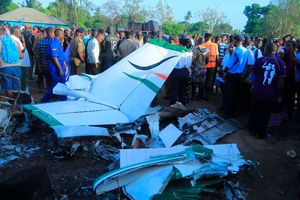Why the government is ending tax waivers for tourism sector

Tourism and Wildlife Cabinet Secretary Najib Balala during a past press briefing.
What is your ministry and the Kenya Wildlife Service (KWS) doing to ensure you rid the national parks and reserves of corruption so that our wildlife can be safe? Onesimus Sironka, Kajiado
The biggest success of our wildlife conservation efforts,has been the reduction in poaching and illegal grazing in our parks and reserves. KWS has enhanced anti-poaching and intelligence-led law enforcement operations, as well as strengthening collaboration with stakeholders, law enforcement agencies (multi-agency approach) and local communities.
As a result, rhino poaching has reduced by 93 per cent from 59 cases in 2013 to four in 2019, while no rhino has been poached this year — the lowest since 2008. Elephant poaching has also reduced by 90 per cent from 384 cases in 2012 to 38 in 2019, while 10 elephants have been poached this year — the lowest since 2007.
As a ministry and in line with government directives, we don’t condone any form of corruption. As a way to protect any such occurrences from happening, KWS developed and is implementing a corruption detection and prevention policy and a staff code of conduct. I can assure all Kenyans that our wildlife is safe.
The government is rolling back some tax relief measures it had instituted to cushion individuals and businesses from the adverse effects of Covid. What measures has the government put in place to secure the tourism sector from the impacts of the pandemic? Said Mohamed, Mombasa
Tourism is one of the sectors most affected by the Covid-19 pandemic, impacting economies, livelihoods, public services and opportunities on all continents. The ministry is in the process of rebuilding tourism through innovation, digitalisation, responding and re-imagining the new Covid-19 reality.
The government has put in place a number of measures to support the tourism industry during this pandemic period and beyond. The following government programmes are being implemented by my Ministry:
Provision of Tourism Stimulus Package of Sh3 billion as soft loans for hotel refurbishments. These loans are given at five per cent interest rates for a 10-year period with one year moratorium.
Some 216 applications were received in October 2020 from all over the country for a total of Sh7.3 billion. Disbursements for successful applications will be done in January 2021.
Provision of Sh500 million for marketing to help the tourism sector recover. Increased funding for the Kenya Utalii College to continue training and capacity building of workers in the hospitality sector.
A new Tourism Strategy is being developed to make Kenya the destination of choice taking into consideration the new reality that Covid-19 has brought.
Provision of the government stimulus package of Sh1 billion. This will involve recruiting 5,500 community scouts by KWS to support conservation by community members. Additionally we are also supporting 3,500 rangers from 160 conservancies through paying their salaries for two years.
Appreciating the role of the private sector in conservation, the one year rent moratorium for all lodges/hotels within KWS National Parks/Reserves which was issued from July 1, 2020 runs up to June 31, 2021.
To encourage visitation to the parks, the ministry revised park entry fees downwards between 15 to 50 per cent from July 2020 to June 2021.
The government has waived visa fees for all categories of travellers entering Kenya for 24 months with effect from January 1, 2021, with a view of motivating travellers to visit Kenya.
The government developed the Magical Kenya and Travel Health and Safety protocols for the new norms to guide the gradual reopening of the tourism sector. The protocols have been acknowledged and awarded “safe travel” stamp by the World Travel and Tourism Council (WTTC).
On rolling back on the waivers, the government needs money to support education, health, security and this cannot be done without revenue. Reverting back to the former tax percentage is a painful but necessary decision.
Airbnb is now an ascendant threat to traditional hotels. How is the ministry leveraging on the potential of Airbnb to attract tourists while also protecting them from unscrupulous individuals out to fleece them? Bernadette Ayuma, Nairobi
Data from Airbnb shows that Kenya had more than 6,500 listings at the end of 2018. This growth is exponential and shows that the conducive environment that the government has created is encouraging more people to join the Airbnb market.
The Tourism Regulatory Authority gives licences and works with the private sector to standardise this upcoming accommodation facilities.
Why did you look the other way when public land belonging to the Nairobi National Park was illegally hived off the eastern perimeter border and dished out to big private investors for spurious reasons? Stanley Rogo, Nairobi County
No land was lost by Nairobi National Park. Indeed, Nairobi National Park expanded by 2,000 acres, which is a milestone of unprecedented proportion. It is a first for a national park in Kenya to have had its area increased in recent history.
In addition, another 52,000 acres have been secured for conservation in the dispersal area of Nairobi National Park by inviting and encouraging landowners to set aside this area purely for wildlife.
With the onset of coronavirus, this meant drastic slowing down of a number of activities in your ministry. Will you negotiate with the Treasury to retain unutilised budget for future use by your ministry? Githuku Mungai, Nairobi
The government put in place austerity measures to cushion the economy against the adverse impacts of Covid-19. This necessitated reallocation of resources to support Covid-19 response programmes. Therefore, the ministry has no unutilised budget.
If there is anything that the pandemic has taught us, it is that our tourism sector is over-reliant on international visitors. How can this be reversed? Jeremy Anampiu, Kilifi
Covid-19 has also given us an opportunity for transformation by giving priority to domestic tourism. It is clear that domestic tourism is the engine of sustainable tourism development in Kenya.
Traditionally, Kenyans have been reluctant to travel for leisure. They limit their travel to visiting friends and relatives.
Over the last few years, the ministry and private sector players are involved in a coordinated marketing effort aimed at promoting domestic tourism. Campaigns such as the Tembea Kenya campaign has supported these efforts.
Also, improved infrastructure, particularly the road network, SGR and increase in local flights will go a long way to grow domestic tourism. Availability of alternative accommodation like homestays, shared residency, Airbnb among others has also reduced the cost of Kenyans travelling within our boarders.
As the tourism sector registers less than impressive returns as a result of the Covid pandemic, it is now geared to be hit by two political shocks: the proposed referendum and the 2022 General Election. How does the ministry and the government in general intend to blunt the impacts of the two political events so that their impact on tourism is not seriously felt? Joseph Wamwangi, Nairobi
Elections are done all over the world and are the only democratic means of transfer of power. They do not always lead to violence. The experience of 2017 General Election showed that tourists are more discerning and are aware about the Kenyan destination. The 2017 elections did not affect our foreign arrivals. Further, we do not anticipate any violence either in proposed referendum or in the 2022 elections.
An audit of animal trophies in government custody published in June 2020 revealed that there are 15, 093 trophies. Given that Kenya banned the sale of ivory and trade in rhinoceros horns, of what value are the trophies to the government? Makau Fabian, Mtito Andei
Kenya's policy on game trophies is non-commercial disposal. I have an obligation as the Cabinet Secretary to declare every year through a gazette notice all wildlife trophies in government stores for accountability. The trophies in our stores are of a heritage value to Kenyans.
The Animal Orphanage and Safari Walk at the Nairobi National Park have largely remained the same over the years with very little improvement on attractions, if any. How can KWS attract visitors to the park if this continues? Janerose Muthoni, Syokimau
The Animal Orphanage and Safari Walk have not had any significant improvement for the last couple of years. However, we are working with partners to redesign and improve the visitor experience in these facilities. Shortly, you will witness an improvement of the board walks, diversity of wildlife with better views and digital interpretation. We are introducing additional product experiences particularly in these facilities under a new programme named The Kenya Parks Initiative. The initiative aims at revamping and innovating the wildlife product to meet the customer satisfaction.
What will it take your ministry to establish tourism promotion centres in every county or constituency? Albert Mwangi, Nakuru
Promotion of local tourism is the responsibility of every county government working together with tourism stakeholders. This includes establishing tourism information centres, investing and attracting investments in new tourism products, developing local tourism circuits, developing attractive cultural heritage offerings, providing proper signage to and storytelling on local heritage sites amongst others. The ministry is working with counties to support them in these areas.
What is still missing from the Western Circuit to make it more competitive? Anne Owino, Siaya
The Western Circuit is experiencing low numbers yet it has the largest number of people visiting friends and relatives. If these can be encouraged to enjoy leisure and tourism, then the issue of numbers will be taken care of. Some of the reasons the region is lagging behind include lack of awareness of the potential of the region, lack of tourism infrastructure, good tourism products which have not been developed and packaged, lake front not open to leisure use and lacking in facilities, and lack of developed leisure activities. However, the ministry is looking towards this area because of its vast resource and potential.
Tourism is yet to be fully devolved yet some counties like Nakuru have passed legislation for the setting up of a Tourism Marketing Board for its immense tourism potential for foreign and local tourists. How do you intend to handle this matter given that some stakeholders have been pushing for open competition between the two levels of governments? Dan Murugu, Nakuru
The setting up of a Tourism Marketing Board by Nakuru County is welcome as this will enable the county work with product owners to promote the county tourism offerings.
Nakuru hosts unforgettable tourism experiences and these deserve to be promoted. On the other hand, the national government efforts concentrated in promoting the totality of Kenya offerings to the world mainly through KTB.
We work very closely with county governments and tourism stakeholders and there is no space for competition. As an example, the ministry, in the last two years, has asked every county to identify and develop two products that can be marketed to local and international tourists.
This column takes a brief break





